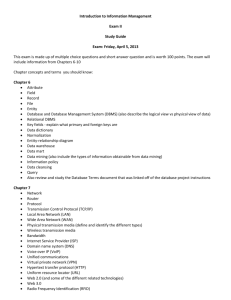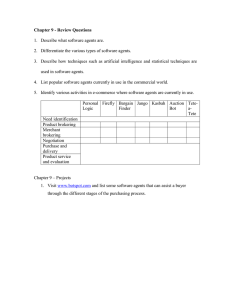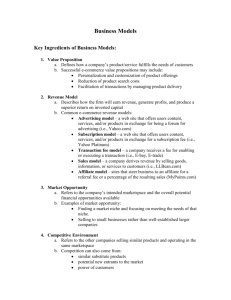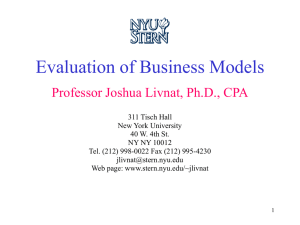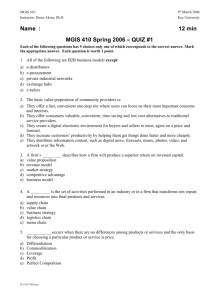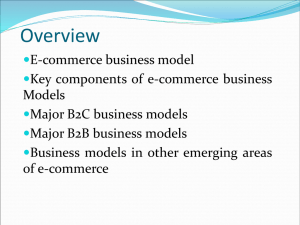Chapter 9 - Online Services
advertisement
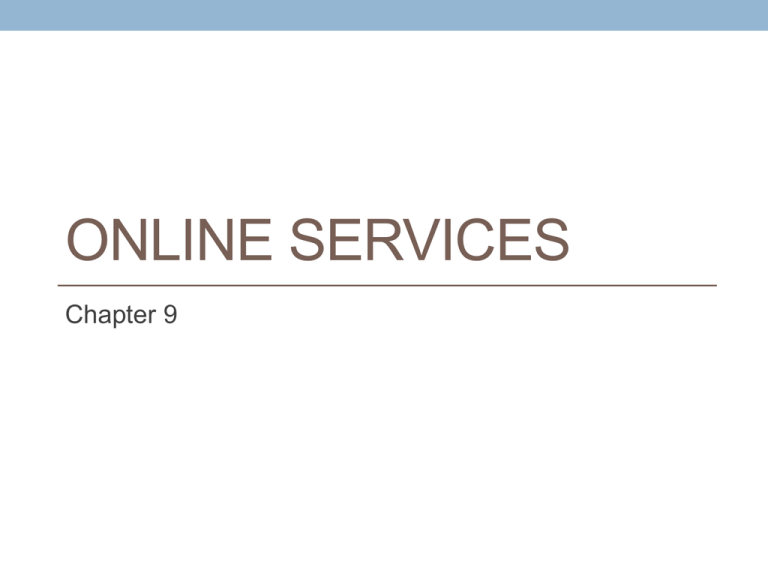
ONLINE SERVICES Chapter 9 Learning Objectives • Describe the major features of the online service sector • Discuss current trends in the following online industries: • financial services • travel services • career services • legal services The Service Sector • Largest and most rapidly expanding part of the economies in advanced industrial nations • In the US, the service sector (broadly defined) employs about four out of every five workers and accounts for about 75% of all economic activity • E-commerce in the service sector offers extraordinary opportunities to deliver information, knowledge, and transaction efficiencies What are Services? • Service occupations are “concerned with performing tasks” • Two service categories include: • Transaction brokers • “hands-on” services • Transaction brokering involves acting as an intermediary to facilitate a transaction • In hands-on services the service provider and client need to interact directly • Which of the categories has been most impacted by ecommerce? Service Industry Groups • The major service industry groups are: • Finance, insurance, real estate • Travel • Legal and accounting, and business services • Health services • Educational services • In this chapter we will focus on characteristics and trends in the three of the largest, and most successful, online transaction brokering industries • Online financial services • Online travel services • Online career services Online Financial Services • The online financial services sector is a shining example of an e-commerce success store, but one with many twists and turns • Innovative, pure-online firms such as E*Trade have transformed the brokerage industry • Impacts on large, powerful banking, insurance, and real estate firms have been delayed by consumer resistance and lack of industry innovation • For instance, online-only banks have not displaced or transformed traditional banks Online Financial Consumer Behavior • Surveys show that consumers are attracted to financial sites because of their desire to save time and access information • Most online consumers use financial services sites for mundane financial management, such as checking balances on existing accounts • Once accustomed, consumers move on to more sophisticated capabilities such as using personal financial management tools, making loan payments, and considering offers from online institutions • The number of people using mobile devices for financial service needs is also surging Financial Portals and Account Aggregators • Online financial services also enable some new services that would be more difficult to perform offline • Financial portals provide consumers with comparison shopping services, independent financial advice, and financial planning • Account aggregators pull together all of a customer’s financial (and even nonfinancial) data at a single personalized Web site Online Travel Services • Online travel is one of the most successful B2C e-commerce segments • Today, more travel is booked online than offline • Online travel services revenues are expected to grow to almost $170 billion in 2017 • Travel services appear to be an ideal service for the Internet • It is information intensive and requires significant consumer research • Travel requirements can be accomplished online • Travel service sites do not require any “inventory” • Suppliers are highly fragmented and often have excess capacity • Major sectors include airline tickets, hotel reservations, car rentals, and travel packages Online Travel Industry Dynamics • Because much of what travel agency sites offer is a commodity, and thus they face the same costs, competition among online providers is intense • Price competition is difficult because shoppers, as well as online site managers, can comparison shop easily • Therefore, competition among sites tends to focus on scope of offerings, ease of use, payment options, and personalization • Some industry trends include: • Consolidation to build stronger multi-channel sites • Impacted by meta-search engines that scour the Web for the best prices on travel and lodging • Use of mobile devices and apps is increasing Online Career Services • Next to travel services, one of the Internet’s most • • • • • successful online services has been job services Online job market is dominated by two large players – CareerBuilder and Monster The top sites generate more than $1 billion annually in revenue from employers’ fees and consumer fees A 2013 survey found that around 70% of US Internet users had looked for jobs online LinkedIn is also becoming an increasingly important player in this market Recruitment market segments (Table 9.7) • General recruitment sites • Executive search sites • Niche job sites Online Career Services Trends • Trends for 2013-2014 in the online recruitment services industry include the following: • Consolidation – industry dominated by two sites • Diversification – explosion of specialty niche sites • Localization • Job search engines/aggregators • Social networking • Mobile


